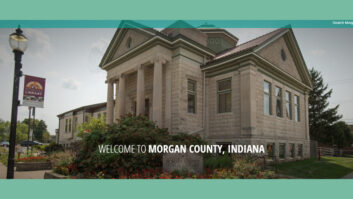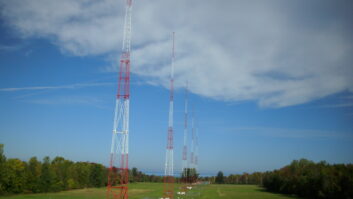
Presenter Fungai Mawada broadcasts from
Ya FM’s Zvishavane studio.
HARARE — Six of the eight Zimbabwean regional commercial radio stations licensed in March 2015 have not started broadcasting due to economic hardships.
Only Ya FM, located in the southern mining region of Zvishavane and Zimpapers’ Diamond FM in the eastern part of the country are operational. The others, Faya FM, KE 100.4 FM, Hevoi, Breeze FM, Skyz FM, Nyaminyami FM, are struggling to make it on air.
According to Pres. Robert Mugabe’s spokesperson and permanent secretary for the Ministry of Information George Charamba, the government is concerned about the off-air stations.
CONCERN
“Speaking from a policy point of view I am worried,” he said. “You’ve shrinking economic activity, a shrinking advertising budget and within that shrinkage a reassignment of money, which was initially allocated for advertising, and you have eight stations battling for that dwindling cake.”
He said some stations were struggling and the government would go back to the drawing board in order to assist.
“When you see more than one failure, it suggests a trend, and you go back to the drawing board and ask if it’s the broadcaster who’s failing, or if it’s the way we’ve structured our industry which is not sustainable.”

Diamond FM presenters Hardlife Zuweni
(aka Hardy Zuw) and Mercy Ngwebvu (aka Wasu)
broadcast live during the station’s launch in May.
Qhubani Moyo, chief executive of Fairtalk Communications, owners of Bulawayo-based Skyz FM and Breeze FM located in the tourist resort of Victoria Falls, confirms the difficulties broadcasters in the country are facing. He explains that they are preparing to launch Skyz Metro and Breeze in “a difficult environment” that is affecting every company in Zimbabwe.
To avoid violating licensing rules, Fairtalk Communications set-up studio facilities for Skyz Metro FM and began training presenters.
“We are confined to government policy, which says all radios licensed in 2014 have 18 months to commence broadcasting,” said Moyo.
AB Communications, proprietors of Hevoi FM and Faya FM, blame the slow start-up on a stringent tax system. The company, which is owned by the current Minister for Information, Communication and Technology Supa Mandiwanzira, believes the regulatory environment is not conducive to efficient operation. “A station has to pay various fees, yet there is no broadcasting fund to assist the country’s broadcasting infrastructure, said Susan Makore, AB’s CEO. AB Communications already runs Zimbabwe’s first privately owned national commercial radio station, ZiFM Stereo.
HIGH TAXES
After paying US$10,000 to get licensed, stations also need to purchase reliable studio equipment, which is not always readily available in the country. They also have to pay annual license fees of up to $15,000 to the regulator, Broadcasting Authority of Zimbabwe and transmission fees to Transmedia, the signal distributor. The Zimbabwe Media Commission is paid $2,000 annually for registration as a media house and separate accreditation fees for all journalistic staff.
State-controlled Zimpapers runs Star FM national talk radio. Its sister company Kingstons Limited is still to launch KE100.4 FM in the capital Harare and Nyaminyami FM in Kariba on the northern border with Zambia.
Despite Ya FM [the station attracted global attention after baboons vandalized its fiber optic cables damaging the radio link] going on air first, CEO Munyaradzi Hwengwere of holding company Ray of Hope and former Zimbabwe Broadcasting Corp. CEO, affirms the hardships.
“We launched at a time when the economy is not helpful for new business. Adverts are hard to come by and the market, in general, is harsh and ignorant as to how many people we reach, as well as the potential of areas outside the major cities of Harare and Bulawayo,” said Hwengwere.

Pictured from left to right during the Diamond FM launch are the Zimbabwe Provincial Minister Mandi Chimene, Diamond FM Station Manager Leander Kandiero, Information and Broadcasting Minister Mushohwe and Delma Lupepe, board chairman for the Zimpapers group.
DIVERSIFICATION
To compensate for lack of advertising revenue, the station has invested in the health food and sportswear businesses. “That’s the state of the economy we are in, yet advertising should be sustaining us,” added Hwengwere.
While applauding the government’s intention to review and find solutions to the challenges faced by the broadcasting industry in its attempts to liberalize the sector, the media advocacy body, Media Institute of Southern Africa (MISA-Zimbabwe), noted some key concerns relating to the sustainability and democratization for the sector.
In particular, it pointed to the “absence of a sustainable model for the country’s three-tier broadcasting system comprising public, commercial and community broadcasters” and the “unrealistic funding provisions in the broadcasting regime.”
With the ongoing plummet of the economic climate in Zimbabwe, the set-up and operation of new radio stations continues to prove difficult.
John Masuku reports on the industry for Radio World from Harare, Zimbabwe.












